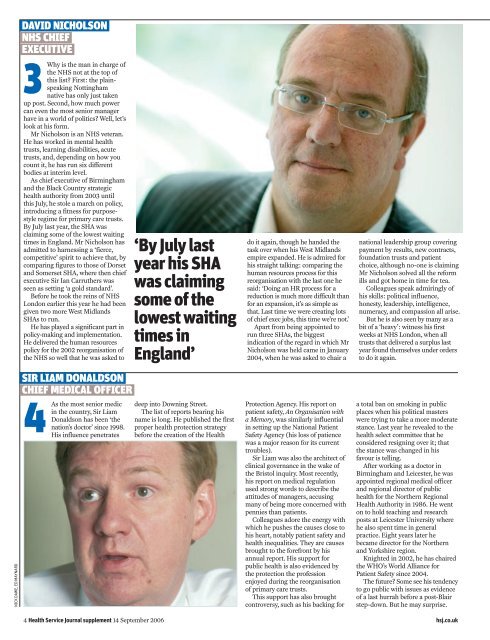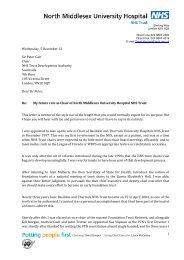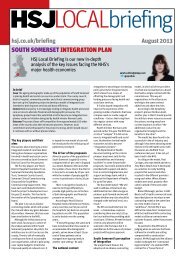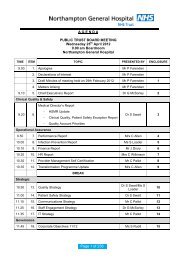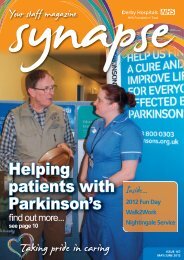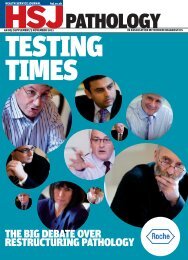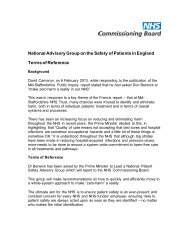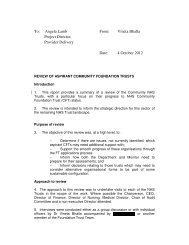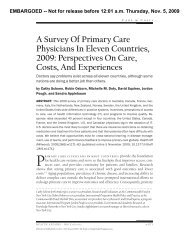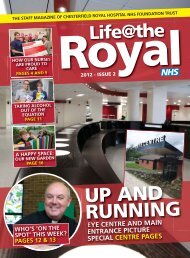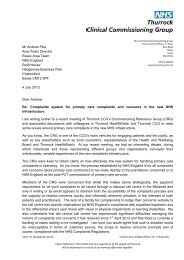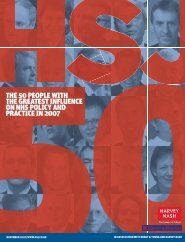NICK DAWE, ED MAYNARDDAVID NICHOLSONNHS CHIEFEXECUTIVE3Why is the man in charge ofthe NHS not at the top ofthis list? First: the plainspeakingNottinghamnative has only just takenup post. Second, how much powercan even the most senior managerhave in a world of politics? Well, let’slook at his form.Mr Nicholson is an NHS veteran.He has worked in mental healthtrusts, learning disabilities, acutetrusts, and, depending on how youcount it, he has run six differentbodies at interim level.As chief executive of Birminghamand the Black Country strategichealth authority from 2003 untilthis July, he stole a march on policy,introducing a fitness for purposestyleregime for primary care trusts.By July last year, the SHA wasclaiming some of the lowest waitingtimes in England. Mr Nicholson hasadmitted to harnessing a ‘fierce,competitive’ spirit to achieve that, bycomparing figures to those of Dorsetand Somerset SHA, where then chiefexecutive Sir Ian Carruthers wasseen as setting ‘a gold standard’.Before he took the reins of NHSLondon earlier this year he had beengiven two more West MidlandsSHAs to run.He has played a significant part inpolicy-making and implementation.He delivered the human resourcespolicy for the 2002 reorganisation ofthe NHS so well that he was asked toSIR LIAM DONALDSONCHIEF MEDICAL OFFICER4As the most senior medicin the country, Sir LiamDonaldson has been ‘thenation’s doctor’ since 1998.His influence penetrates‘By July lastyear his SHAwas claimingsome of thelowest waitingtimes inEngland’deep into Downing Street.The list of reports bearing hisname is long. He published the firstproper health protection strategybefore the creation of the <strong>Health</strong>do it again, though he handed thetask over when his West Midlandsempire expanded. He is admired forhis straight talking: comparing thehuman resources process for thisreorganisation with the last one hesaid: ‘Doing an HR process for areduction is much more difficult thanfor an expansion, it’s as simple asthat. Last time we were creating lotsof chief exec jobs, this time we’re not.’Apart from being appointed torun three SHAs, the biggestindication of the regard in which MrNicholson was held came in January2004, when he was asked to chair aProtection Agency. His report onpatient safety, An Organisation witha Memory, was similarly influentialin setting up the National PatientSafety Agency (his loss of patiencewas a major reason for its currenttroubles).Sir Liam was also the architect ofclinical governance in the wake ofthe Bristol inquiry. Most recently,his report on medical regulationused strong words to describe theattitudes of managers, accusingmany of being more concerned withpennies than patients.Colleagues adore the energy withwhich he pushes the causes close tohis heart, notably patient safety andhealth inequalities. They are causesbrought to the forefront by hisannual report. His support forpublic health is also evidenced bythe protection the professionenjoyed during the reorganisationof primary care trusts.This support has also broughtcontroversy, such as his backing fornational leadership group coveringpayment by results, new contracts,foundation trusts and patientchoice, although no-one is claimingMr Nicholson solved all the reformills and got home in time for tea.Colleagues speak admiringly ofhis skills: political influence,honesty, leadership, intelligence,numeracy, and compassion all arise.But he is also seen by many as abit of a ‘heavy’: witness his firstweeks at NHS London, when alltrusts that delivered a surplus lastyear found themselves under ordersto do it again.a total ban on smoking in publicplaces when his political masterswere trying to take a more moderatestance. Last year he revealed to thehealth select committee that heconsidered resigning over it; thatthe stance was changed in hisfavour is telling.After working as a doctor inBirmingham and Leicester, he wasappointed regional medical officerand regional director of publichealth for the Northern Regional<strong>Health</strong> Authority in 1986. He wenton to hold teaching and researchposts at Leicester University wherehe also spent time in generalpractice. Eight years later hebecame director for the Northernand Yorkshire region.Knighted in 2002, he has chairedthe WHO’s World Alliance forPatient Safety since 2004.The future? Some see his tendencyto go public with issues as evidenceof a last hurrah before a post-Blairstep-down. But he may surprise.4 <strong>Health</strong> <strong>Service</strong> <strong>Journal</strong> <strong>supplement</strong> 14 September <strong>2006</strong> hsj.co.uk
LORD WARNERMINISTER OF STATE FOR REFORM5The longest-serving ministerin the current team, LordWarner is generally felt tohave performed head andshoulders above hiscolleagues since being appointed inJune 2003 – not difficult, perhaps, ifyou are up against Melanie Johnsonand Stephen Ladyman. This wasreflected in the promotion to hiscurrent number two position afterthe last election.He has had some tough briefs tocontend with, including the nationalIT programme, the independenttreatment centre programme,hospital-acquired infection and thereview of arm’s-length bodies.One of his first jobs as a juniorminister was to get the FoundationTrust Bill through the Lords. At thetime it looked like a deeply troubledpolicy, not helped by the recentresignation of the much admiredLord Hunt. In the end it passed,with Lord Warner ‘calm and patientamid the party froth’, according toHSJ political columnist MichaelWhite.Others note his ‘feisty’ and‘naturally combative’ style. He hasthe experience and political radarto know how to maximise hiseffectiveness, and a knack for actingand talking like a human being.More recent priorities includedthe review of regulation andregulatory bodies, its results muchdelayed from the turn of the year.hsj.co.ukHis experience of local government(and the fact he came very close tobecoming chair of the AuditCommission before James Strachan)play an important part.His current role puts him at thecentre of what the government istrying to do to the NHS – hence hishigh standing in this year’s <strong>HSJ50</strong>.He is the minister leading on SHAand PCT reconfigurations,commissioning, choice and paymentby results.He is also the main ministeriallever for the shifting relationshipsbetween primary and acute care,something that will almost certainlycall on his negotiating skills over thenext year.The same applies to thesometimes fraught, but increasinglyimportant relationship betweenlocal government overview andscrutiny committees. If a year oftough decisions about restructuringbegins to unravel at local level andin the press, Lord Warner is likely tobe sent in to quell any disorder. Itmay have been the prime ministerwho said managers could expectsupport from politicians, but it isthis politician who will beshouldering the load.In the past he has been chair ofthe Youth Justice Board for Englandand Wales and has had a long careerin social care (he was director ofSocial services for Kent countycouncil in the late 1980s).HUGH TAYLORACTING PERMANENT SECRETARY, DoH6There are no fireworksabout this job – most ofthe influence it exerts isbelow the surface, visibleonly to the closest ofobservers. But the avuncular andapproachable man who links theDepartment of <strong>Health</strong> to ministersand who is, ultimately, responsiblefor its fitness for purpose has anundeniable impact on strategy andits delivery.In a speech at the NHSConfederation conference in June,Hugh Taylor was frank about someof the failures in the Department of<strong>Health</strong>’s recent past. Speaking aboutthe handling of Commissioning aPatient-led NHS, he said: ‘We got itwrong and we’ve got to be honestabout it.’ He set the failure in starkcontrast to the kind of ‘good policymaking’ behind the national serviceframeworks.How much has this changed?The ‘cock-up’, as HSJ put it, aboutthe national tariff that resultedin its withdrawal was anotherembarrassment which immediatelypreceded former chief executiveSir Nigel Crisp’s departureand Mr Taylor’s promotion.Formerly DoH director of strategyand business development, he hadonly just been promoted to SirNigel’s deputy when Mr Taylor tookthe acting role in March alongsideSir Ian Carruthers (7). The splittingof the role at the time was sold astemporary, although Sir Nigelhimself told HSJ he thought the casefor combining the role had grownweaker over the past few years.Many agreed that, whatever thephilosophical case for a combinedrole, it was simply too big for oneindividual to cope with. Some,such as Conservative spokesmanAndrew Lansley (21), supported thesplit as a path towards greaterindependence from politicians.Mr Taylor’s rise to deputythis year, effectively running thedepartment, is seen as one resultof McKinsey’s review of DoHeffectiveness. His further promotionsuggests he retained the supportof ministers even as the credibilityof his boss Sir Nigel leaked away.A DoH long-server, he wasdirector of external and corporateaffairs before being promoted to runthe new corporate management anddevelopment group in 2003.Before that he was a seniormanager in the Prison <strong>Service</strong>,the Cabinet Office and was alsodirector for NHS workforcein the NHS Executive.The Department of <strong>Health</strong>originally said recruitment for apermanent secretary would beginonce a permanent chief executivewas named. It remains to be seenwho fills that post, how soon andwhether Mr Taylor continues toexert influence in another role.‘His promotionsuggests heretainedministers’support evenas Sir Nigel’scredibilityleaked away’14 September <strong>2006</strong> <strong>Health</strong> <strong>Service</strong> <strong>Journal</strong> <strong>supplement</strong> 5


